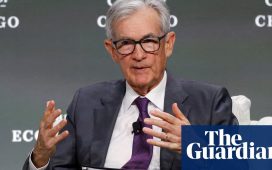Franco-German borrowing spread hits seven-year high
The gap between French and German borrowing costs has blown out to its highest level in seven years this morning.
Investors are piling into safe-haven German debt today, amid anxiety over the French parliamentary elections.
French bond prices tumbled on Monday, after president Macron called snap elections. There’s been a modest recovery since, but not enough to repair the damage.
In contrast, German bund prices are rising today, which pushes down the yield (or interst rates on the bond).
So, while German 10-year bunds are trading at a yield of 2.37% today, the French equivalent is 3.25%.
Ad this chart shows, this is the biggest gap between Paris and Berlin’s borrowing costs since 2017.

Jim Reid, strategist at Deutsche Bank, explains:
For reference, the last time it was this wide in 2017 came just before the first round of the presidential election that year, when Macron came first and set up a run-off in the second round against Marine Le Pen. Then spreads tightened again after Macron’s first-round win, as markets moved to price in a strong likelihood of a Macron presidency.
The real concern unfolding is an outright election victory for Marine Le Pen’s RN party in the parliamentary elections, and a move away from the EU’s fiscal rules, says Chris Weston, Head of Research at Pepperstone.
If there was fresh fiscal indiscipline (spending rises or tax cuts), France’s credit rating could be in focus once again.
Weston explains:
It is also worth considering that Le Pen is unlikely to go too hard on unfunded spending measures, as a blowout in the deficit could be taken in a similar light to the disastrous Liz Truss budget in 2022 and result in bond yields on French debt spiking, which would increase interest costs at a time when debt/GDP is looking like it might head towards 140% by 2040.
It would also almost certainly lead to ratings agency Moody’s cutting France’s sovereign credit rating, joining Fitch and S&P who have already done so.
Key events
Closing post
And finally…. France’s stock market has ended a choppy week, deep in the red.
The CAC 40 stock index fell 2.7% today, taking its losses this week to over 6%, as worries over the upcoming national assembly elections revive market memories of the UK budget rout of 2022.
The premium charged for lending to France, over Germany, remains at a seven-year high too (see earlier post for details).
As Bob Savage of BNY Mellon puts it:
The biggest story of the week is in France post the EU parliamentary vote and the Macron snap election call.
The spread between German and French bonds is up 27 basis points in the week back to 2017 highs – trading 95bps today. The FinMin LeMaire warns of a financial crisis.
More here:
And here’s the rest of today’s business news:
Both th US dollar and the gold price have rallied today.
The dollar is up agains tthe euro and the pound, while gold has gained around 1% to $2,320 per ounce.
Fawad Razaqzada, market analyst at City Index and FOREX.com, explains:
The dollar’s strength came primarily because of a weaker euro, which tumbled to below the $1.07 handle amid ongoing political turmoil in France – something which also hurt European indices and undermined other risk-sensitive currencies.
Europe’s mainland indices were showing losses of 1.5% to 3.2%. The resulting risk-off trade further boosted the appeal of the precious metal as the spread between French and German 10-year government bonds continued to widen.
The chairman of Tesco told investors today he had “no difficulty” defending the £10m pay packet awarded to CEO Ken Murphy.
Gerry Murphy (no relation) told today’s AGM:
“I have no difficulty in defending Ken’s absolute level of pay given the complexity (and) scale of the business, but also particularly its performance.
“We do recruit from time to time at very senior levels from the global market and frankly we just have to be competitive with that market.”
Supermarket sandwich supplier issues recall amid UK E coli outbreak

Sarah Butler
The sandwich maker Greencore, which supplies big supermarkets including Tesco, is one of a number of companies recalling products after being potentially linked to a recent UK outbreak of E coli that caused dozens of people to be hospitalised.
It is understood that the company, which also supplies Asda and Sainsbury’s, is recalling thousands of items, including at least 30 different sandwiches and wraps containing a certain variety of salad leaf linked to the outbreak identified this month by the UK Health Security Agency (UKHSA).
The other manufacturers issuing recalls have yet to be identified as investigations are ongoing into exactly which products have been affected.
Sources said the items being recalled were not believed to contain E coli, as the batch of leaves affected has now been used up, but customers and retailers are being asked to return the items as a precaution.
Reuters: Equinor suspends UK North Sea Rosebank sale ahead of UK elections
Norwegian energy giant Equinor has suspended efforts to sell a stake in the giant Rosebank oil development in the UK North Sea due to fiscal uncertainty ahead of next month’s general election, sources close to the matter have told Reuters.
In its manifesto, the Labour Party has pledged not to issue new licences to explore new fields in the North Sea, arguing that more drilling there would not cut bills and would accelerate the climate crisis.
The Conservatives, though, are pledging to conduct annual licensing rounds of oil and gas production in the North Sea.
Just in: US consumers are gloomier than expected this month, according to the University of Michigan’s latest sentiment report, just released.
*MICHIGAN PRELIM. JUNE CONSUMER SENTIMENT FALLS TO 65.6; EST 72
*MICHIGAN PRELIM. JUNE CONSUMER SENTIMENT LOWEST SINCE NOV.
*MICHIGAN YEAR-AHEAD INFLATION EXPECTATIONS UNCHANGED AT 3.3%
*MICHIGAN 5-10 YR INFLATION EXPECTATIONS RISE TO 3.1%
— Michael Brown (@MrMBrown) June 14, 2024
Surveys of Consumers director Joanne Hsu says:
Sentiment is currently about 31% above the trough seen in June 2022 amid the escalation in inflation.
Assessments of personal finances dipped, due to modestly rising concerns over high prices as well as weakening incomes. Overall, consumers perceive few changes in the economy from May.
Back in the UK, Tesco’s shareholders have approved all the resolutions at its AGM today.
Just 6.5% of votes were cast against the remuneration report, vs 93.5% in favour, despite the concerns over CEO Ken Murphy’s £10m pay packet (see opening post).
European markets remain on the back foot today, says Joshua Mahony, chief market analyst at Scope Markets.
Soaring borrowing costs are already hitting the French government, as the perceived risk attached to a potential victory for the Far Right pushed the cost of sovereign debt higher.
Comments from the French Finance minister over the potential financial crisis could be a potential warning sign to the electorate, but it also sends a message to the market which has clearly been heard.
Defense stocks have been hit by the rise in support for the far right in Europe, Reuters reports.
Shares in Rheinmetall, which makes artillery shells and military vehicles, are down almost 5% today, while the UK’s BAE Systems are down 2.8%.
Reuters reports that ODDO BHF analyst Yann Derocles has suggested that Chancellor Olaf Scholz’ Social Democratic Party’s poor performance in the recent European elections weaken his position, making the governing coalition’s negotiations over the defence budget more difficult.
The anxiety in European stock markets today extends beyond Paris.
Italy’s FTSE MIB has had a rough day too, down 2.7%, while Germany’s DAX has dropped by 1.2%.
In London, though, the FTSE 100 is basically flat.
This week’s share selloff puts France at risk of losing its crown as the largest equity market in Europe, reports Bloomberg.
They add:
The euro is the worst-performing major currency this week against the dollar.
French finance minister warned of financial crisis if far right wins election
French finance minister Bruno Le Maire added to the jitters in the markets today, by warning of the risk of a financial crisis if the far right were to win snap elections in the coming weeks.
Le Maire told franceinfo radio early this morning that:
“When I look at the far right, I see a program that is made of lies,”
And he urged voters instead to back President Emmanuel Macron’s centrist party’s candidates.
Marine Le Pen’s National Rally (RN) party has promised to cut electricity prices, and lower the VAT on petrol, and increase public spending on services such as health.
Could France face Liz Truss-style market panic?
Ouch. The selloff in Paris is gathering pace, sending the Cac40 index down by 2.3% today.
Politicial uncertainty is hurting stocks, with investors anxious that Emmanual Macron’s centrists could lose badly in the upcoming parliamentary elections, spelling the end of pro-growth reforms.
Holger Schmieding, chief economist at Berenberg bank, suggests the consequences could be more wide-ranging, and suggests three potential scenarios:
-
France ends up with a hung parliament in which neither the far right nor the united left nor Macron’s centrists call the shots. Amid gridlock, not much would get done, but no major reforms might be reversed either. The required fiscal consolidation would become even more difficult. At the EU level, further progress towards capital markets union, common defence projects, EU enlargement and other initiatives may stall. That would be unfortunate, but probably just about bearable.
-
Marine Le Pen and her allies can determine the shape of the next government, and of fiscal and economic policies. However, if Le Pen then focusses on her main goal, winning the 2027 presidential election, she might still choose to not rock the boat too badly, concentrating on some signature policies (eg being tough on immigration) rather than on expensive or disruptive promises. If so, the result may be close to the first scenario: no more reform progress, but only a few damaging reversals.
-
However, if Le Pen calls the shots in parliament and pursues major parts of her expensive fiscal and protectionist “France first” agenda, the result could be a Liz Truss-style financial crisis. At the moment, we rate this as a serious risk, not as a forecast.
Sterling on track for best week of year against the euro
It’s also been a strong week for the pound against the euro.
Sterling is on track for its biggest weekly gain against the euro in nearly seven months on Friday, up almost 1% since Monday morning. That would be the best performance since the last week of November 2023.
The pound is trading at €1.1887
Franco-German borrowing spread hits seven-year high
The gap between French and German borrowing costs has blown out to its highest level in seven years this morning.
Investors are piling into safe-haven German debt today, amid anxiety over the French parliamentary elections.
French bond prices tumbled on Monday, after president Macron called snap elections. There’s been a modest recovery since, but not enough to repair the damage.
In contrast, German bund prices are rising today, which pushes down the yield (or interst rates on the bond).
So, while German 10-year bunds are trading at a yield of 2.37% today, the French equivalent is 3.25%.
Ad this chart shows, this is the biggest gap between Paris and Berlin’s borrowing costs since 2017.
Jim Reid, strategist at Deutsche Bank, explains:
For reference, the last time it was this wide in 2017 came just before the first round of the presidential election that year, when Macron came first and set up a run-off in the second round against Marine Le Pen. Then spreads tightened again after Macron’s first-round win, as markets moved to price in a strong likelihood of a Macron presidency.
The real concern unfolding is an outright election victory for Marine Le Pen’s RN party in the parliamentary elections, and a move away from the EU’s fiscal rules, says Chris Weston, Head of Research at Pepperstone.
If there was fresh fiscal indiscipline (spending rises or tax cuts), France’s credit rating could be in focus once again.
Weston explains:
It is also worth considering that Le Pen is unlikely to go too hard on unfunded spending measures, as a blowout in the deficit could be taken in a similar light to the disastrous Liz Truss budget in 2022 and result in bond yields on French debt spiking, which would increase interest costs at a time when debt/GDP is looking like it might head towards 140% by 2040.
It would also almost certainly lead to ratings agency Moody’s cutting France’s sovereign credit rating, joining Fitch and S&P who have already done so.
A bad week for French stock market
Over in Paris, shares are falling again today as political uncertainty continues to hit the French stock market.
The Cac40 index of the largest companies listed in Paris has fallen by 1.7% so far today, taking its losses this week over 5%.
Stocks have been hit by Emmanual Macron’s shock decision last Sunday to all snap parliamentary elections, which could lead to a win for the far-right National Rally (RN).
Investors fear there could be “policymaking paralysis” if RN held a majority in parliament, leading to a “cohabitation” scenario in which the President is from a different political party to the Prime Minister.
The BoE’s latest Inflation Attitudes Survey also found a small drop in inflation expectations – although prices are still expected to rise faster than its 2% target.
The survey shows the public expects inflation of 2.8% next year (vs 3.0% one quarter ago) and 2.6% in two years (vs 2.8% one quarter ago).
Professor Costas Milas, of the management school at University of Liverpool, tells us these are “very disappointing data on public inflation expectations”.
He explains:
These expectations matter because they set the tone for wage increases and therefore impact on future inflation. The BoE sets interest rates with the aim of hitting the 2% target two years ahead.
From the Chart below, the correlation between the Bank’s base rate and public expectations of inflation two years ahead is only 0.16. Today’s data are quite disappointing and definitely point to no interest rate action this month, to say the least…
Public: Cut UK interest rates to help the economy
The UK public are increasingly keen for the Bank of England to lower interest rates to help the economy.
The BoE’s latest Inflation Attitudes Survey, released this morning, shows that 42% of people polled thought it would be best for the economy for borrowing costs to come down.
That’s a small increase on February’s 41%, and – Reuters points out – the highest reading since 2008. In contrast, 10% of people thought higher rates would help the economy.
When asked what would be ‘best for you personally’, 24% of respondents said it would be better for them if interest rates were to ‘go up’, up from 23% in February, 31% of respondents said it would be better for them if interest rates were to ‘go down’, down from 32% in February 2024.
Shondaland CEO opens London trading as Bridgerton ‘boosts UK economy’
The CEO of the firm behind Netflix hit Bridgerton has opened trading at London Stock Exchange today.
Shonda Rhimes is in the City, to mark the return of Bridgerton to UK TV screens – with Netflix claiming that the Regency-style drama (now on its third season) has boosted the UK economy by £275m.
Bridgerton, which is produced by Rhimes’s company Shondaland, has supported 5,000 local businesses over the past five years, Netflix reports. The show has been filmed at many beautiful locations across the UK.
Rhimes says:
The Bridgerton universe occupies a special space in culture, resonating with young and old alike, creating conversation, starting trends and influencing everything from baby names to weddings.
“The shows have also had a seismic impact on the UK economy, boosting it by a quarter of a billion pounds over the last five years and supporting thousands of jobs and businesses.
“It is clear that the business of art and culture can make a huge economic contribution to local communities. I could not be prouder.”
Julia Hoggett, chief executive of the London Stock Exchange, said she was “thrilled to celebrate the significant economic and cultural impact” of the film and creative industries in the UK.








